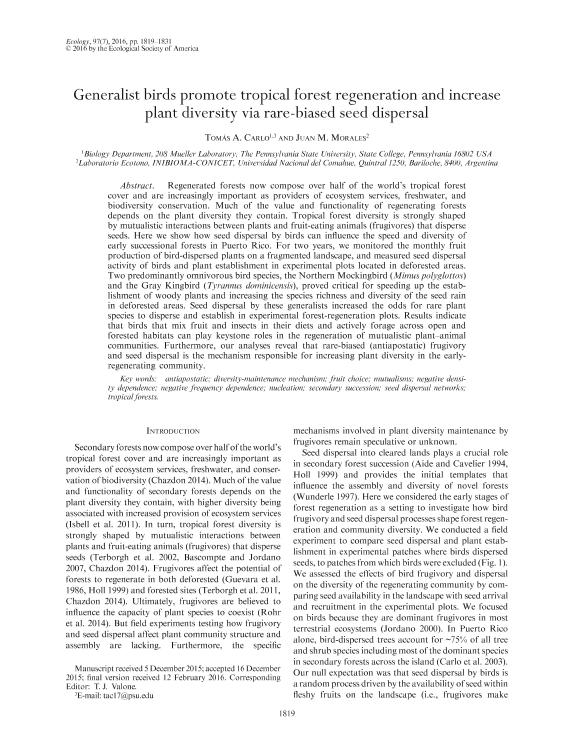Mostrar el registro sencillo del ítem
dc.contributor.author
Carlo, Tomás A.
dc.contributor.author
Morales, Juan Manuel

dc.date.available
2019-02-11T21:11:17Z
dc.date.issued
2016-07
dc.identifier.citation
Carlo, Tomás A.; Morales, Juan Manuel; Generalist birds promote tropical forest regeneration and increase plant diversity via rare-biased seed dispersal; Ecological Society of America; Ecology; 97; 7; 7-2016; 1819-1831
dc.identifier.issn
0012-9658
dc.identifier.uri
http://hdl.handle.net/11336/69940
dc.description.abstract
Regenerated forests now compose over half of the world's tropical forest cover and are increasingly important as providers of ecosystem services, freshwater, and biodiversity conservation. Much of the value and functionality of regenerating forests depends on the plant diversity they contain. Tropical forest diversity is strongly shaped by mutualistic interactions between plants and fruit‐eating animals (frugivores) that disperse seeds. Here we show how seed dispersal by birds can influence the speed and diversity of early successional forests in Puerto Rico. For two years, we monitored the monthly fruit production of bird‐dispersed plants on a fragmented landscape, and measured seed dispersal activity of birds and plant establishment in experimental plots located in deforested areas. Two predominantly omnivorous bird species, the Northern Mockingbird (Mimus polyglottos) and the Gray Kingbird (Tyrannus dominicensis), proved critical for speeding up the establishment of woody plants and increasing the species richness and diversity of the seed rain in deforested areas. Seed dispersal by these generalists increased the odds for rare plant species to disperse and establish in experimental forest‐regeneration plots. Results indicate that birds that mix fruit and insects in their diets and actively forage across open and forested habitats can play keystone roles in the regeneration of mutualistic plant–animal communities. Furthermore, our analyses reveal that rare‐biased (antiapostatic) frugivory and seed dispersal is the mechanism responsible for increasing plant diversity in the early‐regenerating community.
dc.format
application/pdf
dc.language.iso
eng
dc.publisher
Ecological Society of America

dc.rights
info:eu-repo/semantics/openAccess
dc.rights.uri
https://creativecommons.org/licenses/by-nc-sa/2.5/ar/
dc.subject
Diversity Maintenance Mechanism
dc.subject
Fruit Choice
dc.subject
Seed Dispersal Network
dc.subject
Tropical Forest
dc.subject
Antiapostatic
dc.subject
Mutualisms
dc.subject
Negative Density Dependence
dc.subject
Nucleation
dc.subject
Secondary Succession
dc.subject
Seed Dispersal Networks
dc.subject.classification
Otras Ciencias Biológicas

dc.subject.classification
Ciencias Biológicas

dc.subject.classification
CIENCIAS NATURALES Y EXACTAS

dc.title
Generalist birds promote tropical forest regeneration and increase plant diversity via rare-biased seed dispersal
dc.type
info:eu-repo/semantics/article
dc.type
info:ar-repo/semantics/artículo
dc.type
info:eu-repo/semantics/publishedVersion
dc.date.updated
2019-02-05T14:12:04Z
dc.journal.volume
97
dc.journal.number
7
dc.journal.pagination
1819-1831
dc.journal.pais
Estados Unidos

dc.journal.ciudad
Nueva York
dc.description.fil
Fil: Carlo, Tomás A.. The Pennsylvania State University; Estados Unidos
dc.description.fil
Fil: Morales, Juan Manuel. Consejo Nacional de Investigaciones Científicas y Técnicas. Centro Científico Tecnológico Conicet - Patagonia Norte. Instituto de Investigaciones en Biodiversidad y Medioambiente. Universidad Nacional del Comahue. Centro Regional Universidad Bariloche. Instituto de Investigaciones en Biodiversidad y Medioambiente; Argentina. Universidad Nacional del Comahue. Centro Regional Universitario Bariloche. Laboratorio de Ecotono; Argentina
dc.journal.title
Ecology

dc.relation.alternativeid
info:eu-repo/semantics/altIdentifier/url/https://esajournals.onlinelibrary.wiley.com/doi/abs/10.1890/15-2147.1
dc.relation.alternativeid
info:eu-repo/semantics/altIdentifier/doi/https://doi.org/10.1890/15-2147.1
Archivos asociados
